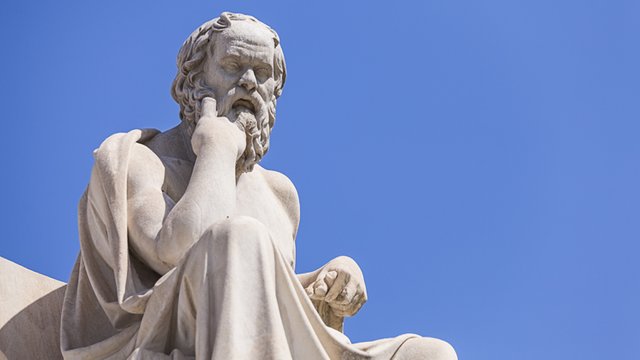As a simple soldier, Socrates takes part in three battles for the city of Athens. In Delium, Amphipolis and Potidaia. There he bravely saves the life of his friend Alkibiades by carrying him safely through a turmoil of enemies from the battlefield.
Also on political field Socrates has opposed the mighty Athens. As one of 500 judges, he takes part in a dubious trial against the victorious generals of the Arginus battle. Instead of glory and honor, the generals expect the groundless accusations that they had not saved men who had fallen into lake distress. Socrates resists condemnation with his unmistakable sense of justice. But in vain. The generals are sentenced to death by a large majority.
A few years later he refuses an instruction in order not to commit a political murder. Kritias, who is at the head of the government, orders some Athenian citizens to arrest the democrat Leon in Salamis and bring him to Athens. The death sentence awaits him there. Socrates is one of the men who are supposed to carry out the order, but he pretends not to have noticed this and sets off home. He owes it to the lucky circumstance that Kritias dies shortly afterwards that this behavior does not become his own undoing.
Soon 70 years old, Socrates made himself more and more enemies among the influential citizens of Athens. Repeated slander creates a mood that should finally lead to the trial in the year 399 before Christ.
Isn't it cheeky when someone destroys certainties and shows ignorance by his insistent questions? And then leave his conversation partners without an answer? Doesn't someone with his criticism of everything who believed for certain shake the basic foundations of the state? Doesn't someone like that even threaten to bring religion to its downfall? If he then still scrapes students around, doesn't such a person pose a danger to young people?
Godlessness and the seduction of youth are the accusations Socrates has to face. But it is not clear from the outset whether the process will be successful. Whether his opponents will succeed in getting rid of an uncomfortable fellow citizen in this way.
His friends want to help him. Socrates could buy himself free from the process. He rejects such thoughts. He also wants to remain true to himself in court.

 Part 3
Part 3 

 Part 5
Part 5 


I know that i know nothing.
Many does not even know this.
Downvoting a post can decrease pending rewards and make it less visible. Common reasons:
Submit
Greetings @oendertuerk, Socrates taught us that to govern a people you do not have to be smart, you just have to learn to think...
Downvoting a post can decrease pending rewards and make it less visible. Common reasons:
Submit
thats it @jexus77 :)
Downvoting a post can decrease pending rewards and make it less visible. Common reasons:
Submit
"Isn't it cheeky when someone destroys certainties and shows ignorance by his insistent questions? And then leave his conversation partners without an answer?"
Haha It still works too. I find that if you keep asking a person why the believe something they will run out of things to say after a while. I once got a Mormon friend to drink a few beers with me by doing that lol.
Downvoting a post can decrease pending rewards and make it less visible. Common reasons:
Submit
It's funny that it's the man who is famous for the phrase"I know that I know nothing" who is also the one we know nothing about (at least not first hand -> Leading to the so-called "Socratic Problem").
Yet he lives on through his disciples and as the founding legend of western Philosophy.
Cheers to you, Sokrates
Posted using Partiko Android
Downvoting a post can decrease pending rewards and make it less visible. Common reasons:
Submit
in a way is that paradox, i know :))
Downvoting a post can decrease pending rewards and make it less visible. Common reasons:
Submit
A post about the revolutionist of logic himself. Great post.
Downvoting a post can decrease pending rewards and make it less visible. Common reasons:
Submit
Downvoting a post can decrease pending rewards and make it less visible. Common reasons:
Submit